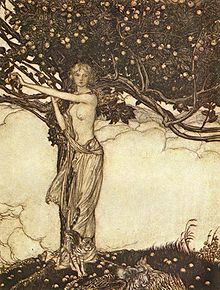Golden apple
The Golden apple is an element that appears in some countries' legends or fairy tales. Usually, a hero (like Hercules or Prince Charming in Eastern countries legends) has to retrieve the golden apples hidden or stolen by a negative character like a zmeu, dragon or a monster. In several non-English languages, the word for "orange" is derived from the phrase "golden apple."
Greek mythology
Atalanta
Three golden apples were featured in Greek mythology, in which a hunter named Atalanta raced against a suitor named Hippomenes who used the golden apples to distract her so that he could win the race.
- "After Atalanta participated in the hunt and received the pelt, her father claimed her as his offspring and wanted her to get married. Although a very beautiful maiden, Atalanta did not particularly want to marry after an oracle told her that she will gain bad luck if she marries. In order to get her a husband, her father made a deal with Atalanta that she would marry anybody who could beat her in a foot race. Atalanta happily agreed, as she could run extremely fast.
- She outran many suitors. The one that finally became her husband accomplished this through brains, not speed. Hippomenes (also known as Melanion) knew that he could not win a fair race with Atalanta, so he prayed to Aphrodite for help. The goddess gave him three golden apples (sometimes the fruit was quince instead) and told him to drop them one at a time to distract Atalanta. Sure enough, she quit running long enough to retrieve each golden apple. It took all three apples and all of his speed, but Hippomenes finally succeeded, winning the race and Atalanta's hand. Unfortunatley, Hippomenes forgot to thank the Goddess and she turned them into lions"
The Garden of the Hesperides

The Garden of the Hesperides was Hera's orchard in the west, where either a single tree or a grove of immortality-giving golden apples grew. Hera placed in the garden a never-sleeping, hundred-headed, dragon, named Ladon, as an additional safeguard. The eleventh Labor of Hercules was to steal the golden apples from the garden.
The Judgement of Paris
- Main articles: Judgement of Paris, Apple of Discord
Zeus held a banquet in celebration of the marriage of Peleus and Thetis. Left off the guest list was Eris (goddess of discord), and upon turning up uninvited she threw or rolled a golden apple into the ceremony, with the inscription which said: καλλίστῃ or, "for the fairest one". Three goddesses claimed the apple: Hera, Athena and Aphrodite. Zeus decided that Paris of Troy would judge their cases. Each of the goddesses offered Paris a gift. Hera would give him power, Athena would make him wise, and Aphrodite offered him the love of the world's most beautiful woman, Helen. Paris chose Aphrodite, and Helen's leaving of her previous husband precipitated the Trojan War.
Norse mythology

In Norse mythology, golden apples grant immortal life to the gods. They are cultivated by the Goddess Iðunn.
One day, Loki, Odin and Thor go on a camping trip. An eagle (a giant in disguise) takes Loki and makes him promise to hand over Idun so that he might wed her and also have eternal youth. Loki agrees and takes Idun to him. The gods don't miss the apples at first but then start to demand where Idun and her apples went. Loki confesses and agrees to get her back under pain of death. He succeeds after a risky flight, and the gods rejoice that they have the apples back.
Golden apples are an important element in Richard Wagner's opera Das Rheingold, prelude of the tetralogy Der Ring des Nibelungen. After building the Walhall for the gods, the giants Fafner and Fasolt asked Wotan to give them Freia, the goddess who cultivates golden apples, as Wotan promised them. When the giants took Freia away, the gods suddenly became old and weak. It convinced Wotan to go to Nibelheim with Loge in order to steal the ring from Alberich, thus getting a substitute for Freia that would please the giants.
Golden apples are associated with a leitmotif. It is first sung by Fafner, when he explains to his brother Fasolt why they must take Freia away from the gods.
Fairy tales

Many European fairy tales begin when golden apples are stolen from a king, usually by a bird. These include:
- Tsarevitch Ivan, the Fire Bird and the Gray Wolf, Russian
- The Golden Bird, German
- The Golden Mermaid, German
- The Nine Peahens and the Golden Apples, Bulgarian
- Prâslea the Brave and the Golden Apples, Romanian, where the thief is not a bird but a zmeu
Modern literature
The William Butler Yeats poem The Song of the Wandering Aengus, has the lines:
- I will find out where she has gone
- And kiss her lips and take her hands;
- And walk among the dappled grass,
- And pluck till time and times are done
- The silver apples of the moon,
- The golden apples of the sun.
Discordia
The contemporary post-modernist religion Discordian uses the golden apple as a metaphor for a practical joke meant to upset the target, like the golden apples of Eris in greek mythology. The term golden apple is also used by Discordians to refer to other Discordians.
Golden apples in other languages
In many languages, oranges are "golden apple." For example, the Greek χρυσομηλιά, and Latin pomum aurantium both literally describe oranges as "golden apples." Other languages like German, Finnish, Hebrew, and Russian have more complex etymologies for the word orange that can be traced back to the same idea.[1]
See also
- The Golden Apples of the Sun
- Pomodoro (from pomo d'oro, "golden apple") is the Italian name of the tomato.
- Apples and oranges
- German Apple Front
- Westchester County
